When it comes to fantasy novels, there are a million ways to worldbuild. Two of my favorites are food and fashion, both of which offer a ton of insights into fantasy worlds that might not seem readily apparent. For example, the types of fabrics characters’ clothes are made of can hint at things like common fiber crops in their world, socioeconomic status (a character wearing fine silks in a world where hemp fabric is far more common is likely to appear wealthier), and what kind of dye plants exist in their world. Similarly, food offers a ton of insight into things like a fantasy world’s cultural inspiration, technology (a society that cooks food over a fire is going to differ a lot from one with ovens), and edible flora and fauna.
When it came time to write my own fantasy novel, Practical Rules for Cursed Witches, I focused a lot on both. The main character, Delilah, is a kitchen witch who casts spells using her baking. While describing tart lemon bars, smooth and chocolatey buckeyes, and flaky garlic biscuits, I was also fleshing out more details about the world. The same goes for the fashion, which helped differentiate the regions the characters hail from while also highlighting their personalities. That in mind, here are five of my favorite books that turn food and fashion into worldbuilding.
Delicious in Dungeon by Ryoko Kui
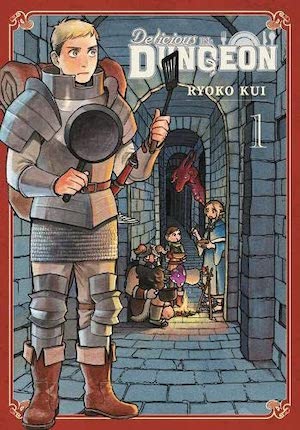
If you’re looking for a masterclass in worldbuilding through food, look no further than Delicious in Dungeon. This manga follows the adventures of a young human—or “tallman” in DiD lore— named Laios who takes his Dungeons and Dragons-style adventuring party on a mission to save his sister, Falin, after she’s eaten by a dragon. As the party enters a dungeon in search of the dragon, they encounter a dwarf named Senshi who uses monsters to create delicious meals. The manga does an excellent job of exploring the nature of various strange and exciting monsters through the food Senshi makes. The search for new monster ingredients, and the lore that surrounds them, makes creatures of legend feel more like real animals one could stumble upon in the wild. With everything from mandrake and basilisk omelets to huge scorpion and walking mushroom hotpot, Delicious in Dungeon has the perfect recipe to seamlessly blend cooking and worldbuilding into one.
Spin the Dawn by Elizabeth Lim
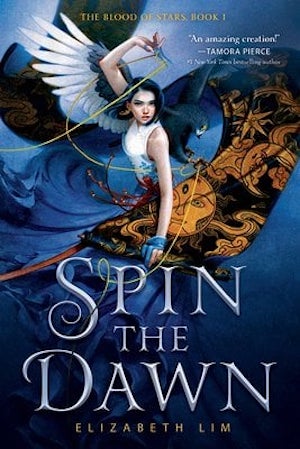
If you’ve ever wondered what a mashup between Project Runway and Mulan would look like, I have great news. Spin the Dawn tells the story of Maia Tamarin, a young seamstress with dreams of becoming a world-renowned tailor. Unfortunately, sexism is alive and well in Maia’s world, making it nearly impossible for her to achieve her dream. However, when Maia’s sickly father is summoned to the Summer Palace to compete in a tailoring competition for the royals, Maia elects to disguise herself as a boy to enter in his place. However, the competition is stiff, and Maia finds herself with the impossible task of three dresses made of the laughter of the sun, tears of the moon, and blood of the stars. This lush East Asian-inspired fantasy uses fashion as a powerful storytelling tool that gives form to the magic of the world. Outside of just that, it also helps paint a picture of the book’s cultural influence with stunning descriptions of fabrics, designs, and dyes. Plus, the swoony romance doesn’t hurt either.
Legends and Lattes by Travis Baldree
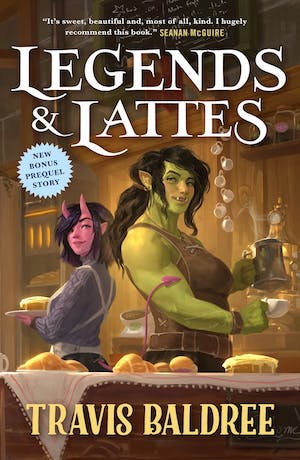
Like Delicious in Dungeon, Legends and Lattes boasts a Dungeons & Dragons-inspired world, but unlike most stories in that vein that focus on grand adventures and saving the world, this novel follows a recently retired adventurer opening her own coffee shop. The main character, Viv, starts out as something of a loner, but over the course of the book, she collects a small found family that I found utterly charming. The sweet sapphic romance was also a highlight. Aside from that, though, one of the most fun elements of the book is the introduction of coffee to the people of Thune, who have never heard of it before. Over the course of the book, Viv manages to win them over as she introduces real-world café staples (iced coffee, to go cups, cinnamon buns) to this fantasy world, all while taking into consideration things like the best cups for different fantasy races’ hands/paws, dietary restrictions, and taste preferences. It’s ridiculously cozy, and Viv’s determination to serve all the residents of Thune allows something as simple as coffee and pastries to be the perfect worldbuilding device.
The Belles by Dhonielle Clayton
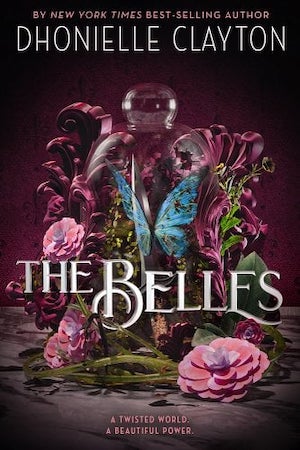
Have you ever heard the phrase never trust a pretty face? That’s essentially the thesis statement behind The Belles. Set in a New Orleans-inspired fantasy world, this story follows Camellia, a young Belle. Belles use their magic to beautify the people of Orléans, called Gris, who are born with red eyes and gray skin. Belles like Camellia can give people any features they desire, from hair, eye, and skin color to body type, but the process is far more brutal than it initially seems. The prose in this book is extremely vivid, with intricate descriptions of delectable foods as well as fashions that help build up the veneer of perfection that slowly begins to crack as Camellia uncovers the dark truths behind her world and magic. The gruesome underbelly of Orléans—which boasts everything from torture to psychological manipulation to murder— and its obsession with beauty and perfection wouldn’t work half as well if it weren’t for the attention to detail when it comes to the lavish gowns, hairstyles, makeup and delectable-sounding sweet treats. Truly, this book plays up cognitive dissonance for worldbuilding in the best possible way.
A Wizard’s Guide to Defensive Baking by T. Kingfisher
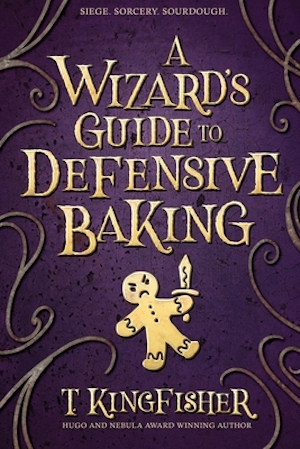
As an author, T. Kingfisher is one of my biggest influences, so it would be wrong to close this list without mentioning her delightful cozy fantasy, A Wizard’s Guide to Defensive Baking. Funny, charming, and adventurous, this story follows fourteen-year-old bakery assistant-slash-wizard, Mona, whose magic powers are limited to controlling bread. However, all is not well—one day, Mona discovers a dead body in the bakery, and immediately she’s blamed for the attack. Now, with an assassin on the loose, it’s up to Mona to prove her innocence and save the magic users who are being targeted. Mona’s bread-based magic is absolutely delightful, and her familiar, a sassy sourdough starter named Bob, steals the spotlight. Readers also learn a ton about the world through Mona’s baking magic, including how the magic system works for individual wizards as well as how minor magic users like her are viewed by their society. Plus, who doesn’t want to read a book with a small army of magic-controlled gingerbread men?
Buy the Book
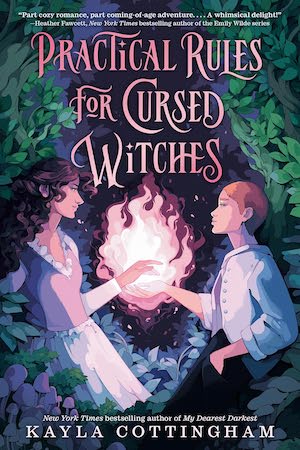

Practical Rules for Cursed Witches










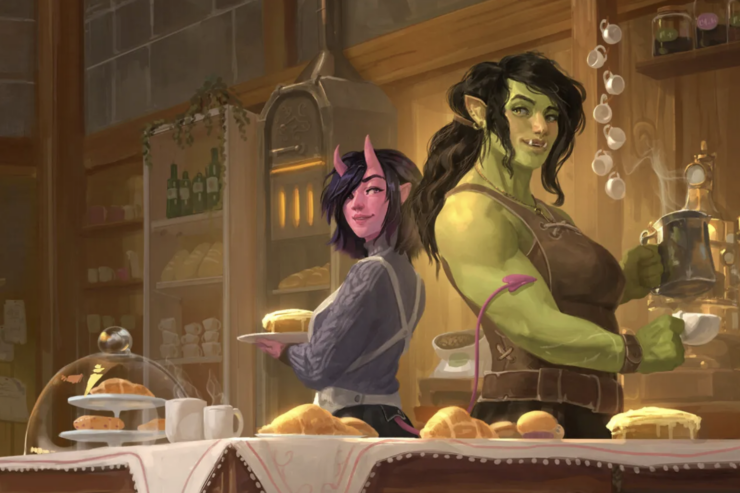
In addition to the great Wizard’s Guide to Defensive Baking, I vote for Stephanie Burgis’ kids’ fantasy, The Dragon with a Chocolate Heart. The young dragon Aventurine is turned into a girl via enchanted hot chocolate, and in human form finds herself working at a chocolate house (cafe featuring chocolate rather than coffee). Great protagonist and supporting characters, solid friendships made, delicious descriptions of chocolate concoctions. Especially fun for anyone who suffers a perfect elder sibling; Aventurine’s older dragon sister is unbearably accomplished.
Clothing has a major role in The Hands of the Emperor. The Emperor always dressed in symbolic colors, in the finest materials an entire world can produce, including the ahalo cloth that is the particular craft of the greatest weavers of the Vangavaye-ve, the distant islands from whence protagonist Kip Mdang hails.
Kip’s clothing, meanwhile, begins as the local equivalent of a suit and tie, a tunic and trousers so conventional in the capital they verge on a uniform. Later his clothing changes due to his changing rank, and all of this is in complete contrast to the clothes worn back home, or the traditional pre-contact styles his mentor and great-uncle favors, where meaning is encoded in patterns of woven leaves and shell and pearl adornments.
How about the elaborate feasts of the Redwall series?